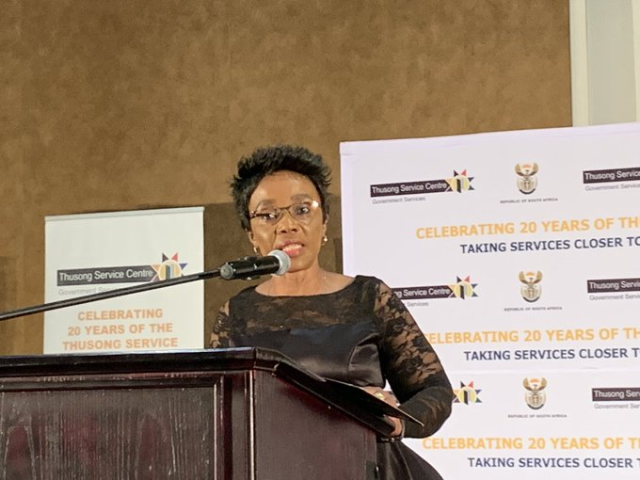Chikunga Urges Collective Action for a Disability-Inclusive South Africa
Addressing attendees, Minister Chikunga praised the SEE Factory as a tangible example of what can be achieved when society unites around inclusion.

- Country:
- India
South Africa must move beyond rhetoric and work together to create a truly inclusive society in which people with disabilities can participate fully and equally in all aspects of life. This was the key message from Minister in the Presidency for Women, Youth and Persons with Disabilities, Sindisiwe Chikunga, during the launch of Disability Rights Awareness Month (DRAM) 2025 in Kimberley, Northern Cape.
The event, held at the Supported Employment Enterprise (SEE) Factory, marked the beginning of a month-long campaign to promote disability rights and inclusion under the theme:
"Celebrating 30 Years of Democracy: Creating Strategic Multisectoral Partnerships for a Disability-Inclusive Society."
SEE Factory: A Model for Inclusion and Economic Empowerment
Addressing attendees, Minister Chikunga praised the SEE Factory as a tangible example of what can be achieved when society unites around inclusion.
"The SEE Factory stands as living proof that inclusion is possible — where persons with disabilities are not spectators in the economy, but skilled workers, producers, and innovators," she said.
The factory employs and trains people with disabilities in manufacturing goods such as furniture, uniforms, and linen, while providing a sustainable model for integrating disability inclusion into economic activity.
Chikunga announced that SEE factories will now be able to supply goods directly to government departments and entities, without going through lengthy tender processes — a policy reform aimed at preserving jobs, reducing state costs, and promoting inclusive procurement.
"The SEE model makes economic sense: it promotes inclusion, supports local manufacturing, and ensures that public procurement restores both income and dignity," she emphasised.
Tackling Exclusion in Education and Employment
Despite progress since 1994, Chikunga highlighted persistent inequalities that hinder persons with disabilities from accessing education and jobs.
"When unemployment among persons with disabilities exceeds 80 percent in some regions, we are not seeing the natural workings of our economy — we are seeing deliberate structural abandonment," she said.
She pointed to inaccessible school infrastructure, scarcity of assistive devices, and under-trained teachers as major barriers to inclusive education.
"Educational inclusion is not about fixing the learner to fit the system — it is about fixing the system to embrace every learner," she said, calling for comprehensive training of educators and equitable access to digital technology.
The Minister also warned that technological advancements, while promising, could widen the gap if accessibility is not embedded from the start.
"Technology promises personalisation, yet without equitable access to devices, connectivity and skills, innovation risks widening rather than closing the gap."
Empowering Women with Disabilities and Addressing GBV
Minister Chikunga expressed concern about the heightened vulnerability of women with disabilities to gender-based violence (GBV), noting that femicide rates remain alarmingly high. She stressed that the intersection of gender and disability magnifies the risks women face in communities and workplaces.
The department, she said, is collaborating with the Minister of Public Service and Administration (DPSA) to issue a directive compelling all departments to employ persons with disabilities until the 4% employment target in the public service is achieved.
Currently, persons with disabilities make up only:
-
1.2% of the public service workforce
-
1.3% of employees in the private sector
These figures fall far below both the 3% national benchmark and the 7% aspirational goal for the public sector.
Cabinet has also directed that all boards of public entities must include at least one person with a disability, ensuring representation at leadership level.
From Policy to Practice: The Road to Full Inclusion
Chikunga reaffirmed the government's commitment to the United Nations Convention on the Rights of Persons with Disabilities (UNCRPD) and the G7 Solfagnano Charter, both of which call for the promotion of equality, accessibility, and human dignity.
She emphasised that building a disability-inclusive society requires multisectoral collaboration — involving government, business, academia, and civil society — to transform systems, infrastructure, and attitudes.
"A society that is inclusive is one where persons with disabilities move freely through our cities on public transport designed with them from the start; where buildings welcome everyone through their doors; and where every digital platform — from government services to banking apps — works seamlessly for all South Africans regardless of ability," Chikunga said.
Partnerships as a Path Forward
In line with this year's DRAM theme, Chikunga called for strategic partnerships that turn policy into real change. She underscored that inclusion must be practical, measurable, and embedded across all sectors — from education to business to government planning.
"The real test of government is whether inclusion moves from paper to practice. Every school, business, and public entity must be part of the machinery that advances the rights of persons with disabilities."
Celebrating 30 Years of Progress and Renewal
As South Africa marks 30 years of democracy, the 2025 Disability Rights Awareness Month serves as both a celebration of progress and a renewed commitment to inclusion. It is a reminder that true democracy means equal participation — and that no one should be left behind because of their physical or mental abilities.
Through SEE factories, inclusive education reforms, employment directives, and collaborative leadership, the government hopes to move closer to a society that reflects the constitutional promise of equality for all.
ALSO READ
-
Trailblazer in Golf: Judy Bell's Legacy of Leadership and Inclusion
-
Zero Mass Empanelled to Boost Financial Inclusion with Bank of Maharashtra
-
Akhilesh Yadav Calls for Caste Data Inclusion in Uttar Pradesh Voter Rolls
-
Africa Urged to Prioritize Vulnerable Groups to Close Financial Inclusion Gap
-
How Smart Fiscal Policies Can Turn Growth into Real Social and Economic Inclusion









